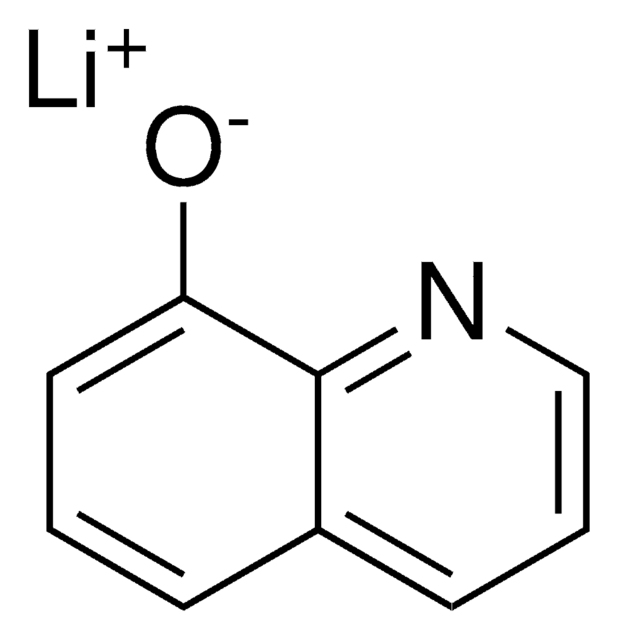734594
N,N′-Di(1-naphthyl)-N,N′-diphenyl-(1,1′-biphenyl)-4,4′-diamine
96%
Synonym(s):
N,N′-Bis(naphthalen-1-yl)-N,N′-bis(phenyl)benzidine, NPB, NPD
About This Item
Recommended Products
Quality Level
Assay
96%
form
solid
mp
275-280 °C
279-283 °C (lit.)
Orbital energy
HOMO 5.5 eV
LUMO 2.4 eV
OLED Device Performance
ITO/NPD/TCTA/BCPO:Ir(piq)3 (7-8%)/BCP/Alq3/LiF/Al
ITO/NPD/TCTA/BCPO:Ir(ppy)3 (7-8%)/BCP/Alq3/LiF/Al
ITO/NPD/mCP/BCPO:FIrpic (8%)/TAZ/LiF/Al
ITO/PEDOT:PSS/NPD/TCTA/m-CBTZ:Ir(Bt)2(acac) (10%)/TPBI/LiF/Al
SMILES string
c1ccc(cc1)N(c2ccc(cc2)-c3ccc(cc3)N(c4ccccc4)c5cccc6ccccc56)c7cccc8ccccc78
InChI
1S/C44H32N2/c1-3-17-37(18-4-1)45(43-23-11-15-35-13-7-9-21-41(35)43)39-29-25-33(26-30-39)34-27-31-40(32-28-34)46(38-19-5-2-6-20-38)44-24-12-16-36-14-8-10-22-42(36)44/h1-32H
InChI key
IBHBKWKFFTZAHE-UHFFFAOYSA-N
Looking for similar products? Visit Product Comparison Guide
Related Categories
Application
Storage Class Code
11 - Combustible Solids
WGK
WGK 3
Flash Point(F)
Not applicable
Flash Point(C)
Not applicable
Choose from one of the most recent versions:
Already Own This Product?
Find documentation for the products that you have recently purchased in the Document Library.
Customers Also Viewed
Articles
In this article, we demonstrate that bis-styrylbenzene derivatives show promising characteristics for very low lasing thresholds and discuss the design considerations for organic lasing molecules.
Since their discovery, organic light emitting devices (OLEDs) have evolved from a scientific curiosity into a technology with applications in flat panel displays and the potential to revolutionize the lighting market. During their relatively short history, the technology has rapidly advanced, and device efficiencies have increased more than 20-fold, approaching the theoretical limit for internal quantum efficiencies.
Professor Shinar highlights low-cost, disposable sensor configurations in organic and hybrid electronics for healthcare applications.
Professor Shinar highlights low-cost, disposable sensor configurations in organic and hybrid electronics for healthcare applications.
Our team of scientists has experience in all areas of research including Life Science, Material Science, Chemical Synthesis, Chromatography, Analytical and many others.
Contact Technical Service

![Di-[4-(N,N-di-p-tolyl-amino)-phenyl]cyclohexane ≥97% (HPLC)](/deepweb/assets/sigmaaldrich/product/structures/111/787/16bde1ce-c76d-46d6-9e1f-9ce09f82d038/640/16bde1ce-c76d-46d6-9e1f-9ce09f82d038.png)


![N-([1,1′-Biphenyl]-4-yl)-9,9-dimethyl-N-(4-(9-phenyl-9H-carbazol-3-yl)phenyl)-9H-fluoren-2-amine ≥97%](/deepweb/assets/sigmaaldrich/product/structures/334/842/a358db6a-5ec8-4c88-902f-856ed7d79fb6/640/a358db6a-5ec8-4c88-902f-856ed7d79fb6.png)




